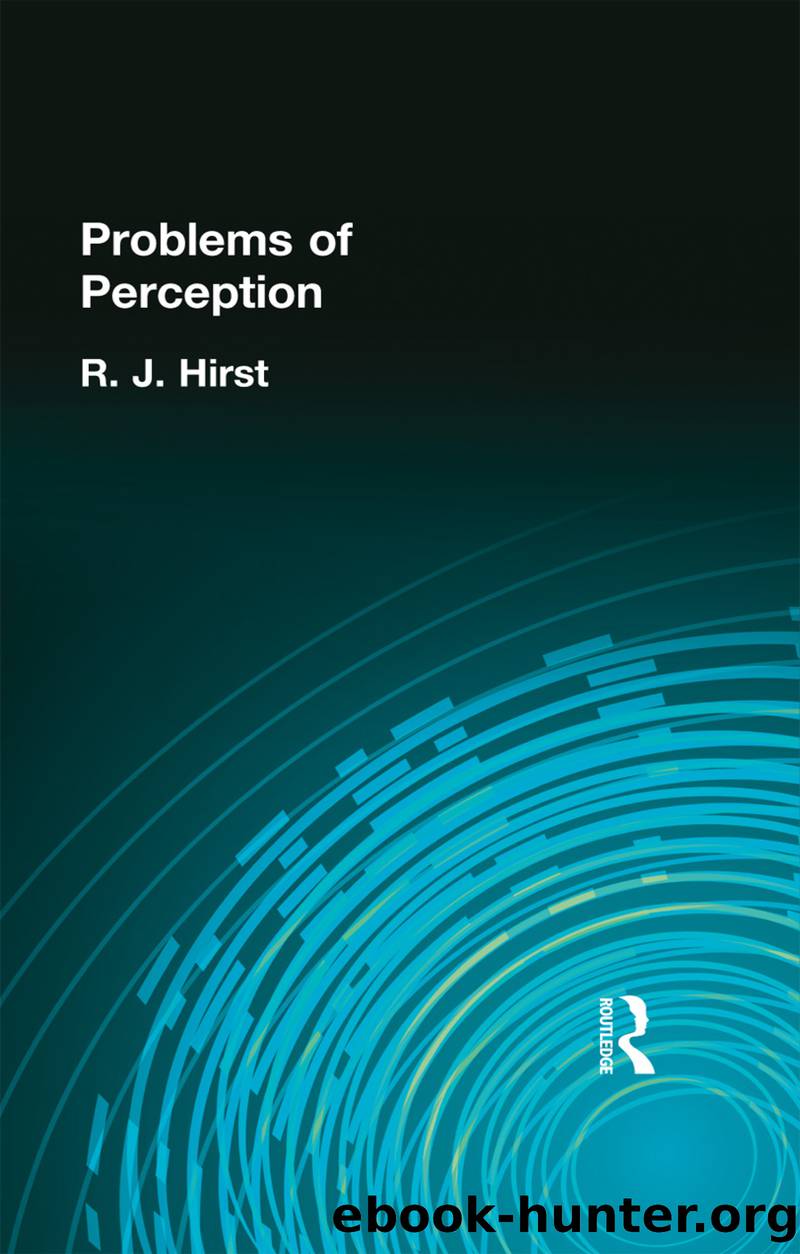The Problems of Perception by Hirst R. J.;

Author:Hirst, R. J.; [Hirst, R. J.]
Language: eng
Format: epub
Publisher: Taylor & Francis Group
Published: 2022-06-18T00:00:00+00:00
6. Its Rejection as an Explanatory Hypothesis
The Representative Theory can thus be rehabilitated to a considerable extent and can be defended against certain traditional alternatives. Nevertheless its new guise as a hypothesis to explain the nature and order of our sense experiences lays it open to criticism from a different quarter and to the charge of being itself unnecessarily complicated, in fact incoherent, as an explanation.
Note first how it differs from the actual assumptions which we unthinkingly make and which I outlined in Chapter I. We take it for granted that what we perceive are external objects; indeed not only are the cats, cabbages and chairs we are aware of taken to be public and external, but so are sounds and smells. Yet the Representative Theory still apparently has to maintain that this is an illusion. We are aware only of sensations or percepts that are in the mind not outside the body, even though it is a reasonable hypothesis to suppose that they are the effects of external objects resembling them in certain ways. But why then are we so chronically deluded, and even when the error is pointed out to us why do we incorrigibly cling to the belief that we are perceiving the external table itself, not just its private effects on us? The Representative Theory would be a better hypothesis if it could give a convincing explanation of this, and a much better one if it could allow us to be partially or wholly right.
Furthermore this claim to be the best hypothesis was advanced as a way of saving the conclusion of the usual version of the theory, âwe perceive only private ideas or perceptsâ, from epistemological disaster. In reply to a common objection it showed how one could proceed from that conclusion to the belief that ideas or percepts have external causes whose nature science can discover by methods other than simple perception. But this is only valid granted that conclusion or as an ad hominem argument against philosophies like Phenomenalism which claim as given merely sequences of sense-data. It is not therefore clear that it escapes the self-refutation charge, namely that the conclusion denies both what it set out to explain, our perception of external objects, and its premiss, that we observe certain facts about sense organs. One might argue that if we did not perceive external objects, including nerves and sense organs, then the theory could never get started and if it did it would defeat its own purpose. For the âfactsâ of the physiological causation of perception which it sets out to explain would themselves dissolve into sensations and hypotheses.
Hence if the theory is to survive, it must maintain that in some way we perceive or observe external objects as well as the sensations or percepts that they cause; and this observation of external objects must be supposed to be more than making inferences or hypotheses from the perception of private data. The best way to accommodate the two perceptions would be to regard the one as the means to the other.
Download
This site does not store any files on its server. We only index and link to content provided by other sites. Please contact the content providers to delete copyright contents if any and email us, we'll remove relevant links or contents immediately.
The European History Highway: A Guide to Internet Resources by Dennis A. Trinkle Scott A. Merriman(494)
The Seven Wonders of the Ancient World by Michael Denis Higgins(476)
European Security in a Global Context by Thierry Tardy(470)
European Security without the Soviet Union by Stuart Croft Phil Williams(469)
The Routledge companion to Christian ethics by D. Stephen Long Rebekah L. Miles(458)
Hudud Al-'Alam 'The Regions of the World' - a Persian Geography 372 A.H. (982 AD) by V. V. Minorsky & C. E. Bosworth(399)
Gorbachev And His Generals by William C. Green(391)
Get Real with Storytime by Julie Dietzel-Glair & Marianne Crandall Follis(390)
Tibetan Studies in Comparative Perspective by Chih-yu Shih Yu-Wen Chen(385)
Governance, Growth and Global Leadership by Espen Moe(381)
Hyperculture by Byung-Chul Han(377)
CliffsNotes on Fitzgerald's The Great Gatsby by Kate Maurer(360)
The Oxford History of the World by Fernández-Armesto Felipe;(354)
How Languages Are Learned 5th Edition by Patsy M Lightbown;Nina Spada; & Nina Spada(352)
The Egyptian Economy, 1952-2000 by Khalid Ikram(351)
Oral Poetry and Narratives from Central Arabia: The Poetry of Ad-Dindan : A Bedouin Bard in Southern Najd (Studies in Arabic Literature, Vol 17) (English and Arabic Edition) by P. M. Kupershoek P. Marcel Kurpershoek(343)
The Oxford Handbook of the Incas by Sonia Alconini(333)
Europe Contested by Harold James(319)
The Hutchinson Dictionary of Ancient and Medieval Warfare by Peter Connolly John Gillingham John Lazenby(305)
